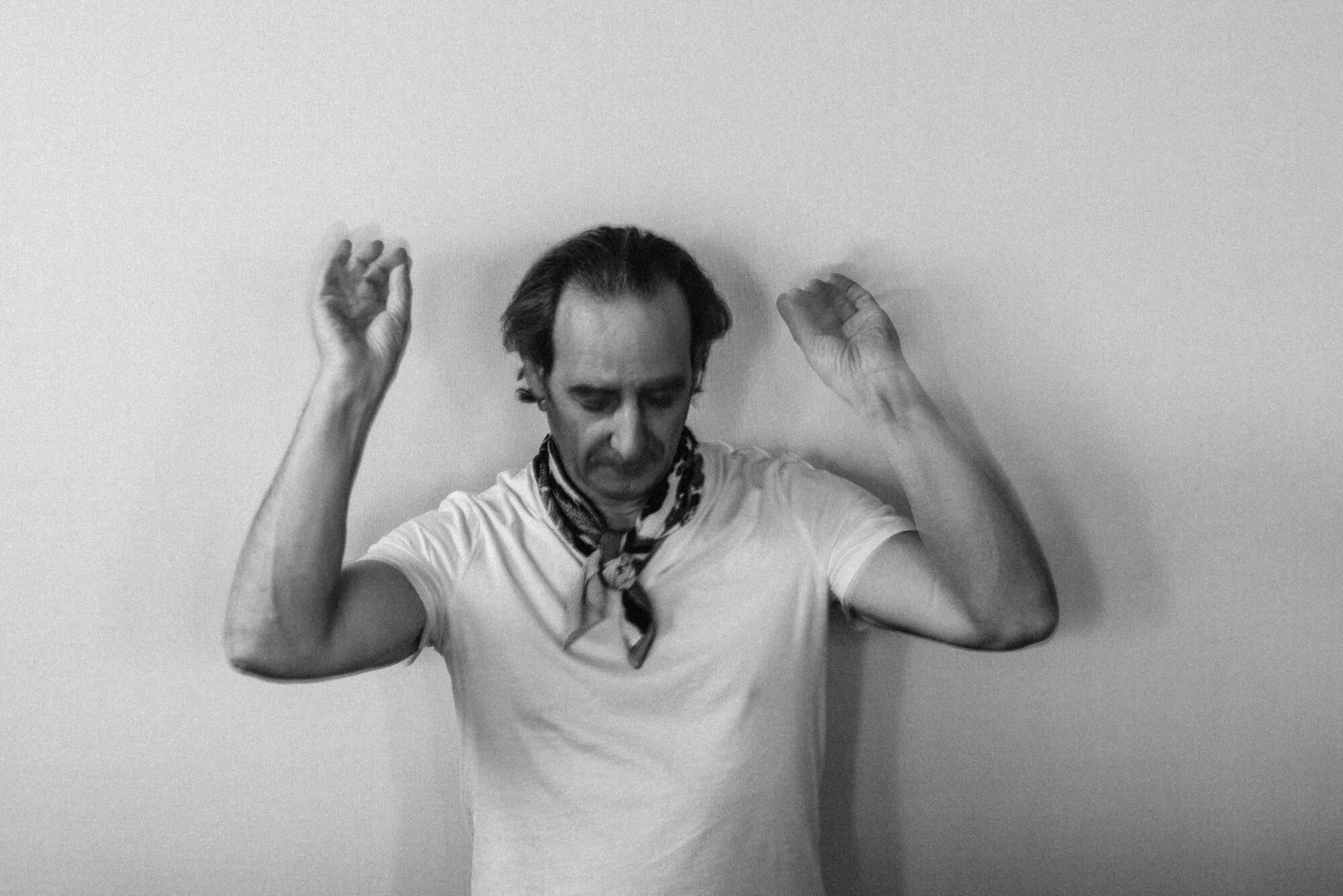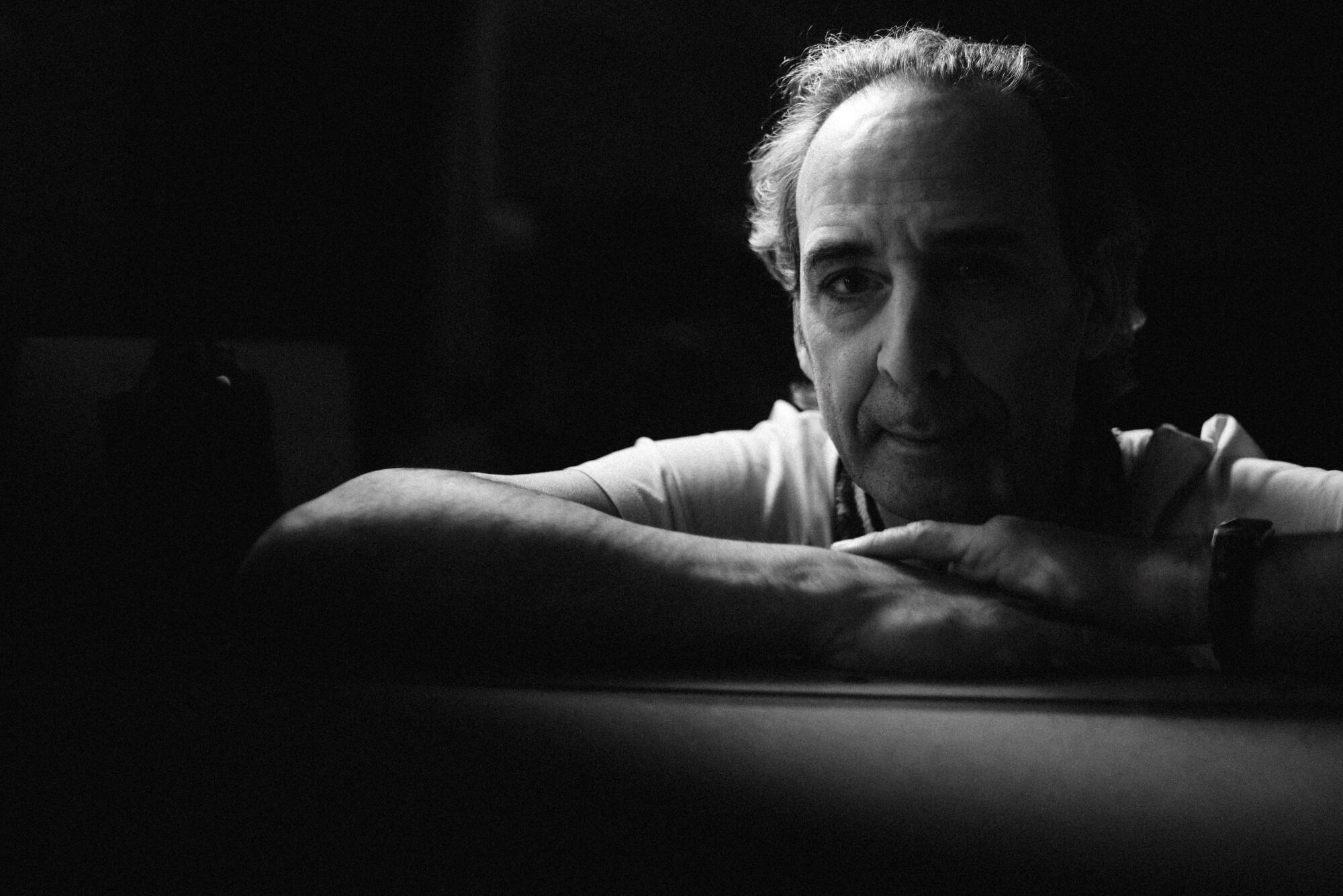An unlimited shadow hovers over the characters in “Jurassic World: Rebirth,” and it’s the identical one which has been dogging composer Alexandre Desplat ever since he was a teen in Paris.
That shadow? The music of John Williams.
“He’s such a legend for all of us,” says Desplat, 63, on a Zoom name from London, the place he’s been burning the midnight oil on the rating for Guillermo del Toro’s upcoming “Frankenstein.” “He’s just the only one to follow.”
Like Williams, Desplat is now a grizzled (although painterly good-looking) veteran himself, with lots of of movies to his identify. He’s already accomplished three scores this yr alone — for the French-Swedish Palme d’Or nominee “Eagles of the Republic,” Wes Anderson’s “The Phoenician Scheme” and this week’s “Jurassic” heavyweight.
He’s additionally making his North American conducting debut on July 15 in a grand survey of his movie profession on the Hollywood Bowl, a becoming, if overdue, coronation of his two-decade reign as an A-list composer in America.
When Desplat started scoring Hollywood movies within the early 2000s, his music swept in like a breath of contemporary French air — elegant, restrained, melodic, idiosyncratic — and the checklist of filmmakers who sought him out reads like a large part of the Criterion Closet: Terrence Malick, Ang Lee, Kathryn Bigelow, David Fincher, Jonathan Glazer, Greta Gerwig.
“He’s the last tycoon of American movie music,” Desplat mentioned in 2010 of his idol John Williams. “He drew a line and we just have to be brave and strong enough to try and challenge this line. With humility, but with desire. It’s a kind of battle.”
(Jennifer McCord / For The Occasions)
His ride-or-die associate is Anderson, who first employed him on “Fantastic Mr. Fox” in 2007 and who teed up Desplat’s first Oscar win with “The Grand Budapest Hotel.” (He’s been nominated eleven instances.) Could’s “The Phoenician Scheme” marked their seventh collaboration.
“As I started being a film composer, I had my idols in sight — of course Hitchcock and Herrmann, David Lean and [Maurice] Jarre, [François] Truffaut and Georges Delerue,” Desplat instructed me in 2014. “All these duets were strong and they showed how important the intimacy between a director and a composer would be for both of them. It’s not only good for the film, it’s good for the composers, because these composers actually developed their own style by doing several movies with the same director.”
In a city too usually stuffed with generic, factory-farmed scores, his have been like a gourmand French meal, regardless that he grew up on the identical food plan of American films and their iconic scores. The younger Desplat was obsessive about U.S. tradition — listening to jazz, watching baseball and the Oscars — and he determined he needed to attain films after he heard “Star Wars” in 1977. Emblazoned on the duvet of that iconic black album have been the phrases “Composed and Conducted by John Williams.”
“That,” Desplat instructed his pal on the time, “is what I want to do.”
It’s becoming and form of humorous that twenty years after charming audiences with a fragile, waltzing rating for the 2003 Scarlett Johansson status image “Girl with a Pearl Earring,” the composer is now selling a stomping monster rating for a blockbuster behemoth starring Johanssson and a bunch of CGI dinosaurs — and tampering with John Williams’ sacred musical DNA.
“Jurassic World: Rebirth” isn’t the primary time he’s needed to courageous the T-rex-sized footprints of his hero: Desplat scored the ultimate two movies within the “Harry Potter” collection, and he was additionally the primary composer on “Rogue One: A Star Wars Story.” He left the latter when Tony Gilroy took over the undertaking from authentic director Gareth Edwards, and earlier than composing any notes.
“I went as far as the change of directors and change of plans,” Desplat explains, “and the weeks passing by, and then I had to move on because I wanted to work with Luc Besson” (on 2017’s “Star Wars”-esque “Valerian and the City of a Thousand Planets”).

“I dreamed of writing for symphonic scores,” Desplat says, “but for many years there was no way I could do it in French cinema, because the movies didn’t offer that, or the producer didn’t offer that. I had to learn how to sound big with very little amount of musicians.”
(Jennifer McCord / For The Occasions)
Very like his work on “Harry Potter,” Desplat’s odes to Williams in “Rebirth” are extra whispers than shouts — although there are a handful of overt declarations of each the long-lasting anthem and hymn for Steven Spielberg’s 1993 dino-masterpiece. Extra delicate homages arrive in his use of solo piano and ghostly choir, and within the opening three notes of his motif for the workforce led by Johansson’s character — a tune that just about begins like Williams’ “Jurassic” hymn.
“So there’s a connection,” Desplat says. “I take the baton and I move away from it.”
He composed new leitmotifs for surprise, for journey, for hazard. His rating, very like the unique, is an amusement park journey filled with sudden drops, humor and family-friendly terror, with a couple of moments of cathartic, introspective aid.
Principally, Edwards stored pushing him for extra hummable motifs.
“When I was tempted to go back to something more abstract — you know, French movie,” Desplat says, winking — “he would just ask me to go back towards John Williams’ inspiration of writing great motifs that you can remember and are catchy.”
Desplat worries that is changing into an extinct artwork in Hollywood. “I don’t hear much of that in many movies that I watch,” he says. “It’s kind of an ambient texture — which is the easiest thing to create.”
In school, he would hearken to the “Raiders of the Lost Ark” rating on a loop, and as his personal scoring profession developed, he was paying eager consideration to John Williams’ extra intimate chamber scores like “The Accidental Tourist” and “Presumed Innocent” — in addition to juggernauts like “Jurassic Park.” Apart from the music itself seeping in, he discovered that it was necessary to attain each form of movie, irrespective of how huge or small. Williams’ work additionally taught him “that I could have something elegant, classical, but with some seeds of jazz in the chords or in the way the melody evolves.”
Each time he hears somebody speaking dismissively about Williams, Desplat will get defensive. “I want to punch them,” he says, solely half kidding.
“He’s the master, what can I say?” Desplat instructed me in 2010. “He’s the man. He’s the last tycoon of American movie music. So that’s everything said there. He drew a line and we just have to be brave and strong enough to try and challenge this line. With humility, but with desire. It’s a kind of battle.”

Jonathan Bailey and Scarlett Johansson within the film “Jurassic World Rebirth.”
(Jasin Boland / Common Footage )
When Desplat obtained his first Academy Award nomination, for “The Queen” in 2007, the one one that known as from Los Angeles to congratulate him was Maurice Jarre, composer of “Lawrence of Arabia” and “Doctor Zhivago.”
Desplat had met the French legend a couple of instances over time, together with an early invitation to a mixing session for the 1990 movie, “After Dark, My Sweet.” Desplat was aghast when he noticed director James Foley taking away Jarre’s melody and all the varied musical components on the blending board, save for a easy digital thump.
The younger composer expressed his dismay and Jarre calmly mentioned: “It’s his film. I have to accept that.”
“That’s a lesson that I learned very early on,” Desplat says. “I’ve never forgotten that, because it’s still the same,” he laughs.
He was additionally warmly obtained as a younger man by Georges Delerue, the nice serenader of the French New Wave in movies like “Jules and Jim” and “Contempt.” “They were so kind,” Desplat says, “such sweet men, both of them.” (Michel Legrand? Not a lot, Desplat says: “He said awful things about me in books.”)
What all of them have in frequent — apart from a penchant for composing lovely music — is the defiant, transatlantic leap from the French movie trade the place they began to the best perch in Hollywood. Jarre left Paris within the early Sixties after the large success of “Lawrence” and by no means regarded again, forging significant partnerships with administrators like Peter Weir and Adrian Lyne. Delerue uprooted from Paris to the Hollywood Hills after successful his first Oscar in 1980 and scored a couple of hits together with “Steel Magnolias” and “Beaches.”

“I really think that people who work a lot are lazy,” says Desplat, who has already accomplished three scores this yr. “That’s why they work a lot — otherwise they wouldn’t work at all.”
(Jennifer McCord / For The Occasions)
Desplat began professionally in France in 1985 and wrote roughly 50 scores earlier than “Girl with a Pearl Earring,” the English-language movie that put him on Hollywood’s radar. He continues to do French movies amid the summer season blockbusters and American artwork home footage.
“I dreamed of writing for symphonic scores,” Desplat says, “but for many years there was no way I could do it in French cinema, because the movies didn’t offer that, or the producer didn’t offer that. I had to learn how to sound big with very little amount of musicians.”
He enjoys the liberty of a big-budget undertaking. “To be able to have a studio say, ‘Go, write what you need to write.’ The director, he wants an orchestra, he wants 95 musicians. Great! They don’t even say anything. You just go and you record. They book the studio. They book the musicians.”
Nonetheless, the constraints he skilled below gave Desplat a few of his best strengths: creativity, resourcefulness, pace. He needed to orchestrate all the pieces himself, which suggests his music bears a particular fingerprint. And composing for small, generally unorthodox ensembles gave his music a clear, clear signature versus the all-too-typical wall of mud.
He can’t say a lot about his 100-minute rating for “Frankenstein,” which he simply completed recording with an enormous orchestra and choir at each Abbey Street and AIR Studios, and which comes out on Netflix in November. The rationale he does so many movies, Desplat proposes, is as a result of he’s lazy.
“I really think that people who work a lot are lazy. That’s why they work a lot — otherwise they wouldn’t work at all.”


